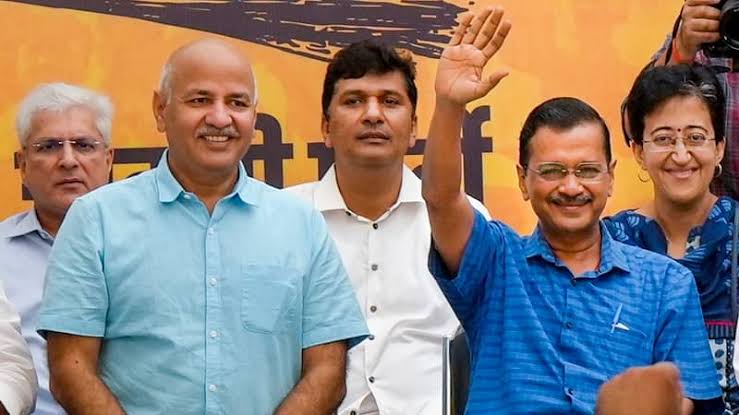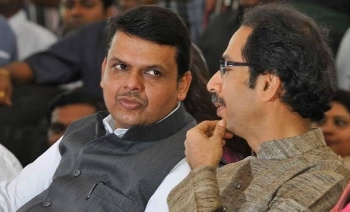The Aam Aadmi Party faces turmoil in 2024, battling legal troubles, leadership changes and electoral setbacks. The party, which is gearing up for the Delhi Assembly elections in February, is determined to rebuild public confidence in its policies and move forward in a political landscape that has been shaped by its governance record and controversies.
The biggest blow to AAP in 2024 was the arrest of its supremo and former Delhi chief minister Arvind Kejriwal by the Enforcement Directorate in March for alleged corruption linked to the excise policy case. This was the first time that a sitting Chief Minister was arrested.
Kejriwal spent nearly six months in Tihar jail before getting interim bail from the Supreme Court in May. The court allowed him to campaign for the Lok Sabha elections, but barred him from resuming official work. This decision affected the regular governance in the national capital.
Kejriwal’s arrest and the legal troubles of other senior leaders significantly affected the image of AAP. However, 2024 was also the year when all the top arrested leaders got bail.
AAP’s Rajya Sabha MP Sanjay Singh got bail in April, former deputy chief minister Manish Sisodia, who was arrested in 2023, was released in August after 17 months in jail and another prominent leader Satyendar Jain got bail in October. Went.
Despite these legal reliefs, these cases damaged AAP’s anti-corruption narrative, and opposition parties used these controversies to question the party’s credibility.
In the 2024 Lok Sabha elections, AAP failed to win any of the seven seats in Delhi, despite its vote share increasing from 18.2 per cent in 2019 to 24.14 per cent in 2024. Moreover, the party could win only three of the 13 Lok Sabha seats it contested in Punjab, where it is in power, dealing a blow to its aspirations.
The results underlined voter dissatisfaction and raised questions about the party’s ability to effectively counter opposition narratives.
In a dramatic development, Kejriwal resigned as chief minister after being granted regular bail in September. Addressing the public, he said, “My heart says that until the court declares us innocent, I should not sit on the CM’s chair… Elections are going to be held in Delhi in the next few months. If you think That if I am not honest then don’t vote for me.”
Kejriwal’s resignation further complicated AAP’s position as it struggled to maintain the narrative of its governance model amid growing public scrutiny.
Senior AAP leader and minister Atishi was sworn in as the eighth Chief Minister of Delhi in September. Symbolically, he left Kejriwal’s chair in the CM office vacant, indicating the party’s hope for his eventual return.
Atishi remarked during her swearing-in ceremony, “I will serve in the same way as Bharat did for Lord Rama, by keeping his Khadaun on the throne.” He indicated his commitment to continue Kejriwal’s governance model.
However, internal challenges continued to grow. The allegation against Kejriwal’s aide Bibhav Kumar of attacking AAP’s Rajya Sabha MP Swati Maliwal inside the Chief Minister’s residence further tarnished the party’s reputation.
Additionally, prominent leaders like Kailash Gehlot and Raj Kumar Anand parted ways with AAP, indicating infighting in the party and further adding to the party’s troubles. The Delhi government also faced administrative hurdles due to constant clashes with Delhi Lieutenant Governor VK Saxena over policy decisions.
Issues like reinstatement of former bus marshals became one of the many contentious issues, highlighting the governance challenges that overshadowed the AAP’s developmental agenda.
As the 2025 Delhi Assembly elections approach, AAP is entering an important phase. It has decided not to forge an alliance with the Congress, as was being speculated after the Lok Sabha election results.
AAP believes that the alliance with the Congress in Delhi for the general elections was a wrong move as the alliance failed to woo the public.
AAP has announced candidates for all 70 assembly seats, with significant changes made to deal with the anti-incumbency wave. 20 sitting MLAs have not been given tickets, and senior leaders have been deployed in different constituencies.
The most prominent name among these is that of Sisodia, who has been sent to Jangpura in South Delhi from his traditional Patparganj seat in East Delhi, which he has held since 2013. Despite the setbacks of 2024, the party is focusing on regaining public trust and reestablishing its anti-corruption credentials while addressing voter dissatisfaction and opposition rhetoric.
The next few months will be crucial in shaping AAP’s political future and determining its ability to regain its position as a credible option in the Delhi political landscape.










